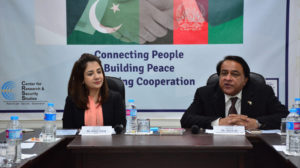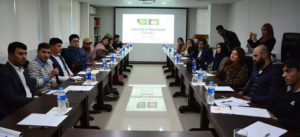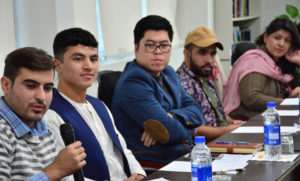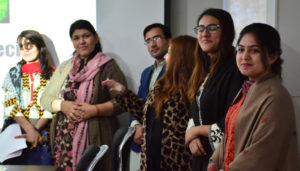The Center for Research and Security Studies (CRSS) conducted a training workshop on “Learning to Appreciate Diversity” for young participants from Pakistan and Afghanistan on Tuesday, November 28, 2017. The workshop was designed as part of CRSS efforts under its Afghan Studies Center (ASC) initiative to bring together young minds from both countries on one platform to interact and exchange ideas from their personal experiences as a way to mitigate the unnecessarily growing mistrust between the two peoples.
Ms. Sehar Tariq, Pakistan country representative for United States Institute of Peace (USIP), was the chief guest and the trainer in the workshop. Participants included 16 young Afghans and Pakistanis studying in various universities across the country, including Quaid-i-Azam University (QAU), International Islamic University Islamabad (IIUI), National Defense University (NDU), Islamia College University Peshawar, Karakorum International University (KIU) Gilgit, as well as other young vibrant activists. Frank Sun, a Chinese researcher also attended the workshop.

The workshop began with an address by Mr. Aized Ali, project Director at CRSS, who apprised the participants with the objectives of Afghan Studies Center which emerged from the recommendations of CRSS’ track II/1.5 diplomacy initiative Beyond Boundaries that has focused on improving the bilateral relations between Pakistan and Afghanistan since 2015. Ms. Sehar was then invited to commence the session on the theme whereupon she invited introductions from all participants to begin on an interactive note. She told the participants that appreciating diversity meant respecting and celebrating the uniqueness of every individual in a society. She emphasized on the need to challenge the negative stereotypes that have built in our society, especially between young Afghan and Pakistani students, and not judge anyone based on how they look, where they belong or even according to how the majority perceives them. She urged the participants to stand up against discrimination in all its forms, be it based on gender, religion, ethnicity or nationality, and open up to people with a fresh perspective to understand them better and give them the space needed to live with equality, acceptance and love in the society.

The workshop encompassed a series of interactive exercises probing the participants from both sides to critically evaluate how they stereotype gender roles and others. Through the various exercises, Ms. Sehar stated that the world has become a global village and the interaction with diverse people will grow increasingly in coming times. Hence, if the youth of both Pakistan and Afghanistan will treat each other, or meet new people from across the world, with biases, they would not be able to grow in a constructive way in the global society. She invited the youth from both countries to start finding common grounds with each and initiate a positive understanding by putting aside their preconceived ideas of each other.

Participants thanked CRSS for providing the opportunity to the youth of Pakistan and Afghanistan to sit together in a joint forum and engage in such critical thinking exercises to develop their leadership skills and motivation for making a better future.
Mr. Aized Ali, Project Director Beyond Boundaries at CRSS, moderated the session and further added that CRSS’ Beyond Boundaries had been a conscious effort to bridge the gulf of mistrust between the two neighbors in the same vein. He encouraged the participants to network among themselves to help improve local perceptions on both sides. The workshop ended with refreshments giving the participants from both countries the chance to interact informally with each other.
The workshop was the fourth in Afghan Studies Center’s series of scheduled workshops for Afghan and Pakistani youth. Through such activities, the center aspires for peace by engaging the youth from both sides in informed discourses, and capacity building through skills development workshops. Alongside such workshops, the center also runs a monthly dialogue series with participation of young men and women from Pakistan and Afghanistan to increase the much needed people to people contact that has been decreasing in recent years.
